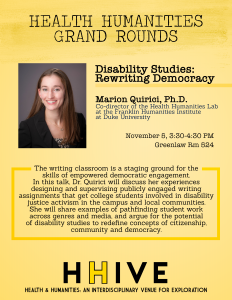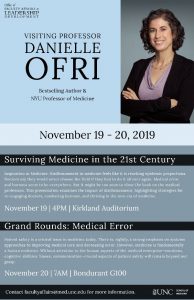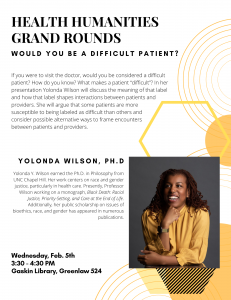2019-2020 HHGR
2019-2020 Speakers
Paul Blom, PhD candidate in the Department of English and Comparative Literature at UNC Chapel Hill
“‘I am not my disease’: Visual Storytelling in South Africa and Eswanti”
Paul Blom discussed his experience co-teaching a course that takes students to South Africa and Eswatini to engage locals in narrative medicine. The experience “reminded that patients are the experts of their condition and to emphathize their personhood. Over the years, Blom and Smith have become friends with those they visit year after year, and have been invited to weddings, parties, and the dinner tables of people they work with. Blom fondly remembers learning traditional dances as much as he recalls the actual studies he completes. Many of the projects center around the lives of the people with the conditions and rather than the conditions themselves,” Kate Capitano writes for our blog.
Nov. 5, 2019, “Disability Studies: Rewriting Democracy” with Marion Quirici, Co-director of the Health Humanities Lab at the Franklin Humanities Institute at Duke University
 “Finding it unfair that the concept of ‘justice for all’ excludes a significant portion of the American population, Quirici teaches courses at Duke on disability studies writing and makes college more accessible to those with a physical or mental disability” Kate Capitano writes for our blog. “She has mentored many activism projects including student created paintings, podcasts with prominent disability advocates, and awareness campaigns which she has compiled at tinyurl.com/disabilityart. All of these projects aim to show that disability justice is future oriented and those who wish to pursue it have to visualize a world that does not yet exist.”
“Finding it unfair that the concept of ‘justice for all’ excludes a significant portion of the American population, Quirici teaches courses at Duke on disability studies writing and makes college more accessible to those with a physical or mental disability” Kate Capitano writes for our blog. “She has mentored many activism projects including student created paintings, podcasts with prominent disability advocates, and awareness campaigns which she has compiled at tinyurl.com/disabilityart. All of these projects aim to show that disability justice is future oriented and those who wish to pursue it have to visualize a world that does not yet exist.”
Nov. 20, 2019, “Medical Error in Modern Medicine” with Danielle Ofri of NYU’s School of Medicine
 “The medical system must dismantle the reigning standard of perfection, which excludes the opportunity for improvement that error offers,” Mili Dave writes for our blog. “Dr. Ofri encouraged physicians to consider the emotions of empathy, guilt, and shame underpinning the occurrence and aftermath of error. Instead of making them the cracks and splinters of medical practice, healthcare providers must mobilize on them as bridge points between doctor and patient. By citing several stories of errors that demoralized doctors, Dr. Ofri underscores that while physicians make the error, they cannot consider themselves the error. Alongside concrete interventions such as checklists, medical education and training must restore in physicians the emotional courage to accept vulnerability. Only then will the medical system begin unveiling the toxic perfectionism and denial that buries error at its core.”
“The medical system must dismantle the reigning standard of perfection, which excludes the opportunity for improvement that error offers,” Mili Dave writes for our blog. “Dr. Ofri encouraged physicians to consider the emotions of empathy, guilt, and shame underpinning the occurrence and aftermath of error. Instead of making them the cracks and splinters of medical practice, healthcare providers must mobilize on them as bridge points between doctor and patient. By citing several stories of errors that demoralized doctors, Dr. Ofri underscores that while physicians make the error, they cannot consider themselves the error. Alongside concrete interventions such as checklists, medical education and training must restore in physicians the emotional courage to accept vulnerability. Only then will the medical system begin unveiling the toxic perfectionism and denial that buries error at its core.”
Feb.5, 2020, “In Praise of Difficult Patients” with Yolonda Wilson of Howard University’s Department of Philosophy
“What defines a difficult patient? Could you be defined as a difficult patient?” Savannah Bateman writes for our blog. “Dr. Yolanda Wilson, an assistant professor of Philosophy at Howard University and current National Humanities Center fellow, utilized these questions to facilitate discussion on the meaning of being labeled a ‘difficult’ patient and its consequences. Ultimately, she demonstrated how this label shapes unjust racial and gender disparities, particularly within the healthcare setting.”


